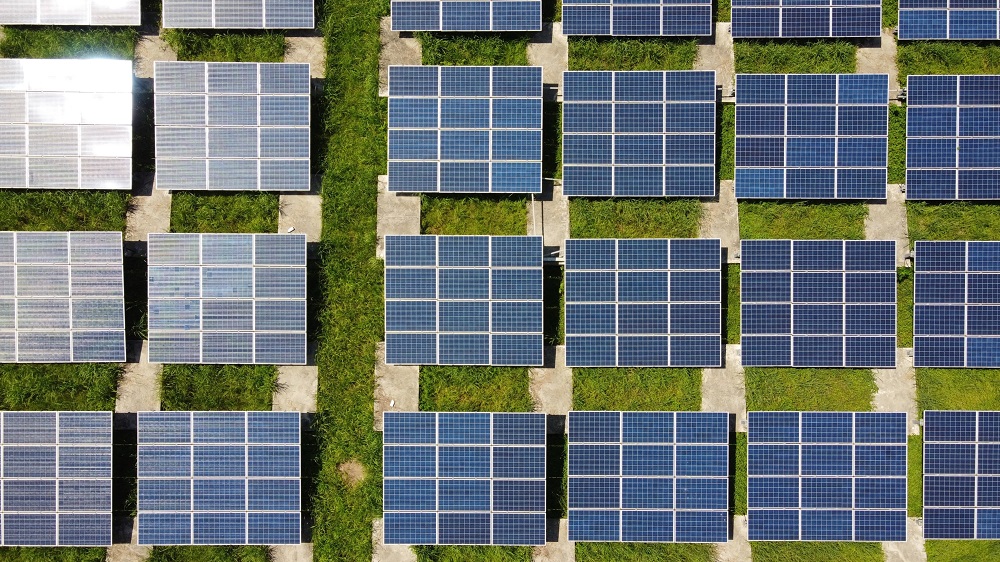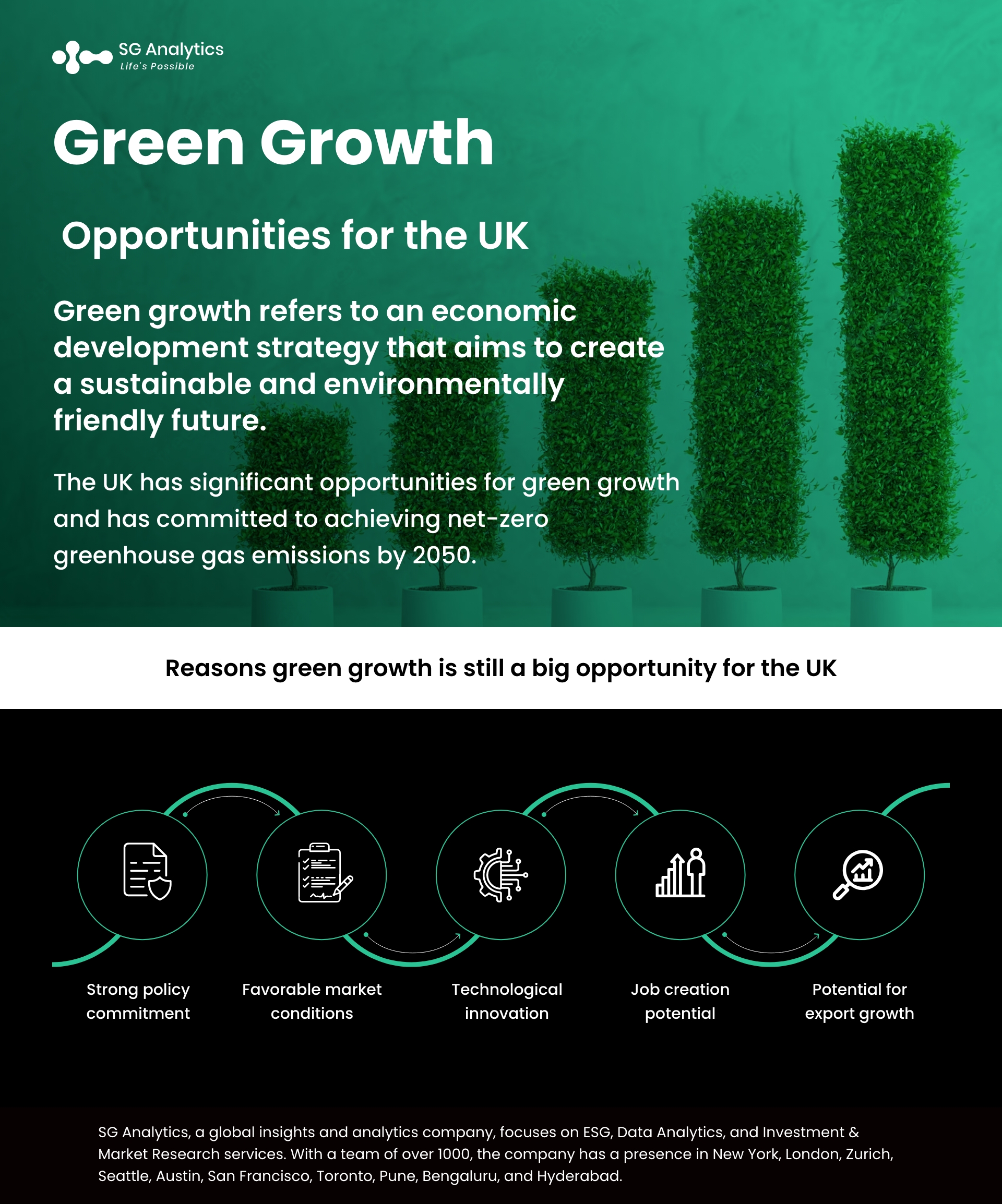Green growth refers to an economic development strategy that aims to create a sustainable and environmentally friendly future. The focus of green growth is on reducing greenhouse gas emissions, preserving natural resources and ecosystems, and improving energy efficiency, all while maintaining green economic growth.
The UK has significant opportunities for green growth, and it has already taken some significant steps in this direction. The country has committed to achieving net-zero greenhouse gas emissions by 2050 and has introduced various policies and initiatives to achieve this goal.
One example of a green growth opportunity in the UK is the growth of the renewable energy sector. The UK has abundant wind and tidal energy resources and has set a target to generate 40% of its electricity from renewables by 2030. The growth of renewable energy is creating new jobs, boosting the economy and reducing the country's dependence on fossil fuels.
The development of low-carbon technologies and goods presents the United Kingdom with yet another chance for green economic expansion. The nation is a pioneer in the production of electric vehicles (EVs), and it possesses a robust automotive industry that is well-positioned to profit from the shift towards low-carbon modes of mobility. The UK government has set a target of achieving 60% of new car sales to be EVs by 2030, which is expected to create new jobs and stimulate green economic growth.
The UK also has a thriving green construction sector, with a focus on building energy-efficient homes and commercial buildings. The UK government has introduced a number of initiatives to encourage the construction of energy-efficient homes, such as the Green Homes Grant and the Energy Company Obligation. These initiatives are expected to create jobs and stimulate green economic growth while reducing greenhouse gas emissions and improving energy efficiency.

Reasons green growth is still a big opportunity for the UK
A great deal of opportunity still exists for the UK when it comes to green growth:
Strong policy commitment
The UK has made a strong policy commitment to green growth, which includes setting legally binding targets for reducing greenhouse gas emissions and promoting renewable energy. One of the most ambitious targets in the world is to reach net-zero greenhouse gas emissions by 2050 in the UK. This policy commitment provides a clear signal to businesses and investors that green growth is a priority for the UK and that there will be a stable policy framework to support the transition to a UK’s green economy.
Favourable market conditions
The UK has favourable market conditions for green growth, including a growing demand for renewable energy, increasing public awareness of the importance of sustainability, and a strong financial sector that can provide funding for green projects. For example, the UK is the world's largest offshore wind market, with a capacity of over 10GW, and the government has set a target of reaching 40 GW of offshore wind by 2030. The UK also has a well-developed green bond market, which allows investors to finance green projects while earning a return on their investment.
Technological innovation
The UK is home to world-leading research and development in green technologies, such as offshore wind and electric vehicles, which can help drive innovation and create new business opportunities. For example, the UK has the largest offshore wind turbine testing facility in the world, which has helped to drive down the cost of offshore wind and make it more competitive with other forms of energy. The UK is also a leader in electric vehicle manufacturing, with companies like Jaguar Land Rover and Nissan producing electric vehicles in the UK.

Job creation potential
The transition to a UK green economy can create new jobs in green industries, which can help address unemployment and underemployment. For example, the UK government estimates that the transition to a low-carbon economy could create up to 2 million jobs by 2030. These jobs could be in a range of sectors, including renewable energy, energy efficiency, green construction, and sustainable transport.
Potential for export growth
The UK can export green technologies and services to other countries, which can help boost economic growth and create new business opportunities. For example, the UK is a world leader in offshore wind technology, and companies like Orsted and SSE are already exporting their expertise to other countries. The UK is also a leader in green finance, with companies like HSBC and Aviva providing financing for green projects around the world.
Overall, these factors make green growth a big opportunity for the UK, and the transition to a green economy could help to create jobs, boost green economic growth, and address environmental challenges like climate change.
Green Growth Opportunities
Green growth offers numerous opportunities for economies, including job creation, resource efficiency, innovation, improved public health, reduced greenhouse gas emissions, enhanced energy security, and increased resilience to climate change. These opportunities can help to promote sustainable and inclusive economic development that addresses environmental and social challenges while promoting economic prosperity. Green growth presents numerous opportunities for economies, including:
Job creation
Several sectors can benefit from green growth, including renewable energy, energy efficiency, green construction, and sustainable transportation. For example, the International Labour Organization estimates that the transition to a low-carbon economy could create up to 24 million new jobs globally by 2030. These jobs could be created in both developed and developing countries and could help address unemployment and underemployment.

Resource efficiency
Green growth can promote the efficient use of resources, such as energy, water, and materials, which can reduce costs and increase competitiveness. For example, using renewable energy sources like solar and wind power can reduce dependence on fossil fuels and lower energy costs over the long term. Similarly, promoting energy efficiency in buildings and industries can reduce energy consumption and lower operating costs.
Innovation
Green growth can drive innovation in green technologies, products, and services, which can create new markets and new business opportunities. For example, the development of electric vehicles and energy storage systems creates new opportunities for the automotive and energy sectors. Similarly, the development of smart grids and energy management systems creates new opportunities for the IT and services sectors.
Improved public health
By reducing air and water pollution, green development can improve public health, hence lowering healthcare expenditures and enhancing the quality of life. Promoting greener modes of transportation, such as electric automobiles and public transportation, can reduce air pollution and enhance respiratory health, for instance. Improving water and sanitation systems can similarly minimize waterborne illnesses and improve public health.
Reduced greenhouse gas emissions
Green growth can lower greenhouse gas emissions, so mitigating climate change and avoiding the economic and social consequences connected with it. For instance, encouraging renewable energy and energy efficiency can cut energy sector emissions. Likewise, supporting sustainable land use and agriculture can cut emissions from the agriculture and forestry industries.

Enhanced energy security
Green growth can enhance energy security by reducing dependence on fossil fuels, which can be subject to price volatility and supply disruptions. For example, promoting renewable energy can reduce dependence on imported fossil fuels and increase energy independence. Similarly, promoting energy efficiency can reduce demand for energy and lower exposure to energy price fluctuations.
Increased resilience to climate change
Green growth can increase resilience to climate change by promoting sustainable land use, water management, and infrastructure development. For example, promoting sustainable agriculture and forestry practices can help to maintain soil health and water availability, which can help to increase food security and reduce the risk of droughts and floods. Similarly, developing climate-resilient infrastructure, such as seawalls and green roofs, can help to reduce the risk of damage from extreme weather events.
Challenges of Green Growth
In the coming decades, all individuals, corporations, and the government will need to make a concerted effort to reach net zero emissions. Success will depend on inventing and embracing new technology and procedures, as well as guaranteeing adequate funds for the necessary investments. In addition, the United Kingdom is well-positioned to accept and capitalize on this challenge. Green energy, the automobile industry, and the need to decarbonize the aviation industry provide some of the largest obstacles.

Nonetheless, the economic opportunity for UK firms is not limited to those on the bleeding edge of technology: most sectors of the economy will need to adapt in some fashion, which creates huge and extensive prospects for enterprises that facilitate the adoption process. The need to generate tens of thousands of new employees across the United Kingdom in order to update its housing stock is a prime example of this. The move to net zero will have repercussions beyond the UK’s green economy. In numerous significant industries, such as manufacturing and transportation, individuals will be required to adapt to new equipment, goods, and procedures.
And while new jobs will be created in some regions, these must be examined against the backdrop of declining employment in other regions. Therefore, training and re-training will play a crucial role in preventing the United Kingdom from experiencing skills bottlenecks that prevent the full potential of the green growth opportunity from being realized and in facilitating the adaptation process so that individuals are able to assume new roles.
Another repeating topic that emerged from our research is the high degree of uncertainty around the transition to net zero emissions. A wide range of estimates for the amount of the potential exists, both in the aggregate and for specific subsectors, in the expectations for growth in the UK's green economy. This is understandable, considering the magnitude of the technological obstacles and the length of time required to attain net zero.
Despite this, our consultees emphasized both the magnitude of the problem and the urgent need to take far more decisive action to prevent dangerous climate change. While we do not yet have all the answers, there is a consensus that clearer green growth strategies are required to clarify what can currently be done, as well as interim benchmarks to ensure that the United Kingdom remains on course. This is especially true for smaller companies. Therefore, there is a need for clear and detailed practical counsel to help different types of businesses grasp the route ahead and guide them as they seek to succeed in a future with zero carbon emissions.
Also Read - How Businesses Can Improve Their Sustainability Performance With ESG.

Conclusion
Green growth refers to economic growth that is environmentally sustainable, and it presents numerous opportunities for the UK, such as creating new jobs in green industries, reducing greenhouse gas emissions, and improving public health by reducing air pollution.
Green growth provides significant opportunities for the UK to achieve sustainable economic growth while preserving the environment and reducing greenhouse gas emissions. The country has already taken significant steps in this direction, and is well-positioned to continue to be a leader in the transition to a low-carbon, sustainable future.
The fund might take a hit, making it harder to combat climate change. There may be less of a willingness and ability to pay for environmental improvements from individuals, corporations, and governments if the economy continues to stagnate. The justification for long-term green investment (such as rail travel to replace short-haul flights) is weakened when energy and transport demand decreases. Furthermore, COVID19 has greatly increased the unpredictability of economic forecasts and, by extension, investment situations.

Building a Greener and Sustainable Future
Before 2023, accountability was seen as pleasant, but that's starting to change. The epidemic refocused attention on sustainability and clean energy. Sustainability, which was previously an overarching issue, is now a key focus for every company. This presents a unique chance for businesses to evaluate their current state and consider how they could reduce their carbon footprint in the near and far future.
There is an increasing effort by companies of all kinds to combat the effects of climate change. They no longer include it in the brand's mission statement, but it has become a unifying notion that drives them to carry out essential tasks.
Companies are developing brand-new, long-term plans. They are stepping up their efforts to lessen their environmental impact by using cutting-edge machinery. This allows them to protect their workers' interests while maintaining open communication. By 2023, brands that need to put sustainability first will have already lost the race.
With a presence in New York, San Francisco, Austin, Seattle, Toronto, London, Zurich, Pune, Bengaluru, and Hyderabad, SG Analytics, a pioneer in Research and Analytics, offers tailor-made services to enterprises worldwide.
SG Analytics is an industry leader in ESG services, providing custom sustainability advice and research to aid in deliberation. If you are looking for an effective ESG integration and management solution provider to improve your company's long-term viability, get in touch with us today.

FAQ
What does it aim to achieve?
Green growth aims to achieve economic growth that is environmentally sustainable by promoting the development and adoption of green technologies, reducing greenhouse gas emissions, and promoting resource efficiency.
What are the green goals of the UK?
The green goals of the UK include reaching net zero greenhouse gas emissions by 2050, generating 40 GW of offshore wind by 2030, planting 30,000 hectares of trees per year by 2025, installing 600,000 heat pumps per year by 2028, and phasing out the sale of new petrol and diesel cars and vans by 2030.
What are the difficulties of a green economy?
The challenges of a green economy include the high upfront costs of transitioning to green technologies, adapting existing infrastructure to accommodate green technologies, balancing economic growth with environmental sustainability, ensuring equitable distribution of the benefits and costs of the transition to a green economy, and addressing potential job losses while creating new job opportunities in green industries.









